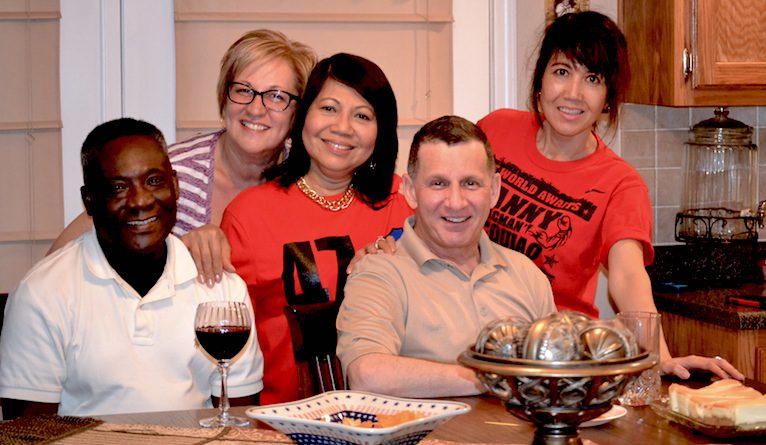
A military chaplain’s life
After four years of active duty as a chaplain (captain) with the US Army, including a tour in Afghanistan, Fr. Mark Mastin, SCJ, is hanging up his uniform. As he was packing his bags and getting ready to join the Dehon Formation Community in Chicago, he reflected on his his military service. Fr. Mark writes the following:
As I officially leave active duty and go into the Army Reserve component, I want to share some reflections on what I did as a chaplain on a daily basis. I will share what I did in the last six months, which is fairly typical of the ministry and work that I performed on a regular basis.
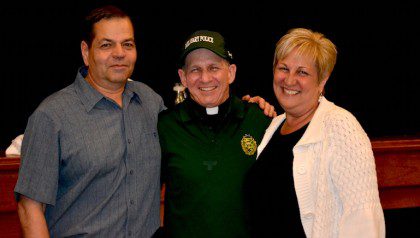
I believe that being in the business world for 18 years helped me in the management side of being a chaplain. For the last eight years of my secular business life I worked directly for the president of the third largest die casting company in the United States, which had divisions in various states. Managing operations and putting together aggregate and finite manufacturing plans was so massive that being in the Army seemed simple in comparison. Working long hours and organizing events fit into my skill set.
As a Catholic chaplain I had two assignments. One was to be a staff officer and chaplain for a battalion and the other was to fill a lieutenant colonel slot as the senior pastor of a Catholic community the size of which could range from 3,000 to 5,000 families. Usually there is only one priest assigned to an installation. The Army priest contracts with a priest from the outside to help with daily and weekend Masses. My role was 24/7 and I had two offices.
My day started at 4:00 a.m. with physical training (PT) with the troops and ended between 9 to 10 p.m. with community meetings or marriage counseling or preparation. The number of soldiers in a battalion can vary from 800 to 1,400. Being part of a brigade and an installation, I had to help out with other battalions and branches of the military such as the Navy and Air Force. In the training environment, new soldiers come and go every ten weeks. There are always unique problems and interesting counseling challenges.
Later my duties included advising the commander, counseling and teaching soldiers, and being the spiritual guide for the battalion. I attended and gave invocation prayers at many events. In addition, I had up to six counseling sessions a day— one hour per meeting. There were retreats for couples and singles. And then there were the training exercises.
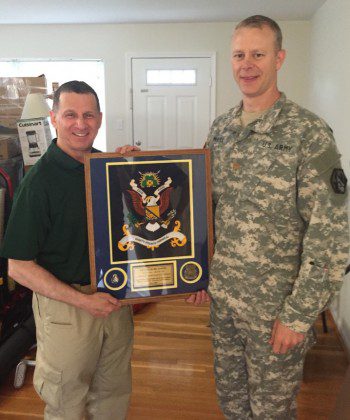
Additionally, I had to fit in my Catholic community duties. I compare this to the task of a priest managing two or three parishes. I had to manage the administrative side, budget planning and management, running a 300-400 person CCD program from kindergarten to high school, youth ministry program, RCIA, confirmation, fund-raisers, socials, etc. Fortunately, I had contracted staff to help with much of the administrative paperwork and execution.
Every day I had Mass. Immediately after the weekday Mass I would spend one to one-and-a-half hours visiting Catholic patients at the hospital. Catching a quick meal did not always happen.
The beauty of military Catholic communities is the love people have for their church. We easily saw over 400 hours of volunteer time per month; parishioners in the military love their priests and do what it takes to get involved and help them.
My philosophy in leading a military parish community, or any community for that matter, has always been to empower people to get involved and take ownership; to make our community a fun place to come to and make worshipping a joyful experience.
I have been blessed to be a part of good Catholic communities in the Army. It is ironic that each community of which I have been a part in the military has been named “Sacred Heart.”
In the last six months I was involved in so many activities. I asked the Sacred Heart military community to do various things. We had a Christmas party and meal for orphans and children with significant behavioral challenges. We reestablished a Christmas Eve Midnight Mass which thousands attended. I thought that it would be a flop but our Catholics wanted a Midnight Mass similar to what they experienced in their childhood. It was impressive to see all ranks from enlisted personnel to generals show up in their dress uniforms for the celebration.
For Thanksgiving and Christmas we not only provided baskets of perishable and non-perishable food to the poor but we also cooked hot meals for them in the area. We helped military families that needed assistance as well.
Prior to Easter, we got permission to teach catechesis to our young soldiers. This was not permitted in the past. Our goal was to help build morals and resiliency in the soldiers. Many have never experienced a life of faith and prayer. We saw soldiers acting in a more positive manner after having attended our classes.
At the Easter Vigil, we brought in ten people to the Church. That is a good number for the military.
I gave retreats and celebrated First Communions: typical parish ministry.
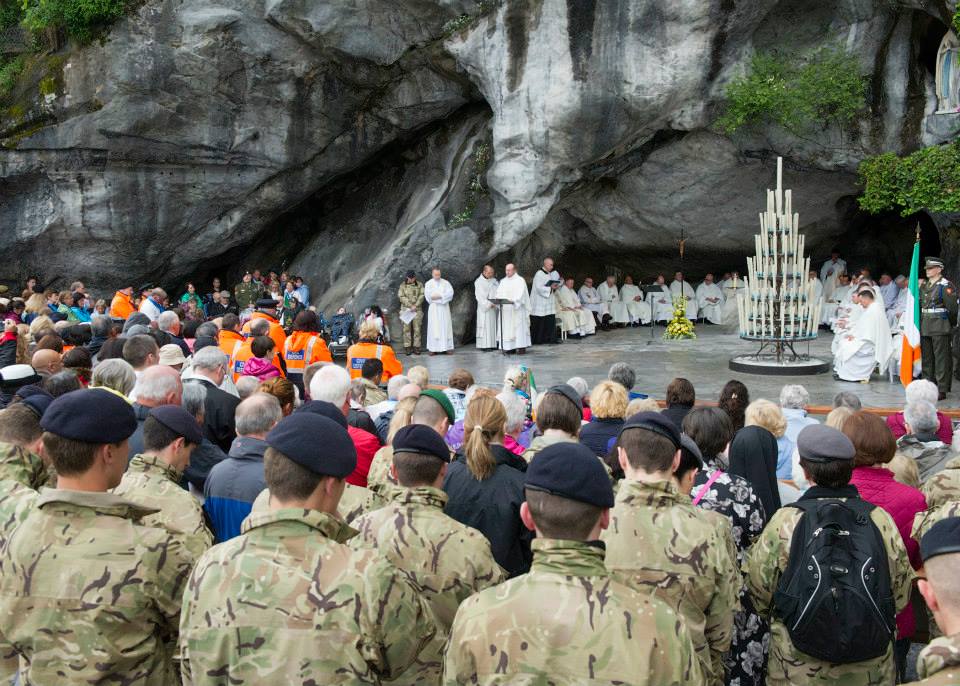
Wounded Warriors visit Lourdes
From May 11-18, I went to Lourdes, France, as a chaplain for 200 wounded warriors. People from 35 countries came to this annual event that is sponsored and paid for by the Knights of Columbus and endorsed by the Archdiocese of the Military. I was honored to give a talk on Matthew’s passage about coming down the mountain after the transfiguration. I prayed that we all, after having been spiritually energized on Mount Lourdes, could sustain the feeling of God in our lives when we returned home. I led reflections each evening with our wounded warriors to help them reflect on how they felt that day.
I was so moved by our wounded vets in Lourdes and their desire for hope. The volunteers were amazing. Towards the end of our time there we marched in formation up the mountainside with our vets to a war memorial. It was a moving moment in two ways. First, it reminded me of my Uncle Tom and his description of marching with his buddies through the streets of France after the Battle of the Bulge. Second and more importantly, the climb and march represented how our wounded vets struggle to climb out of so many personal challenges in their lives.
When I returned from Lourdes my chapel community had a farewell Mass and dinner for me on May 30. It was a moment of great humility. It was an emotional night as I received praise from so many dignitaries and community members.
It was a pleasure serving our soldiers and their families. I may not miss the 4:00 a.m. risings, but I will miss the people. They taught me more about love and living. They gave me more than I could ever have given them.
Honored to be honored
Before concluding his full-time service as an Army chaplain Fr. Mark Mastin was awarded the Meritorious Service Medal (MSM). As he writes below, the medal was far more than a simple “going away” gift:
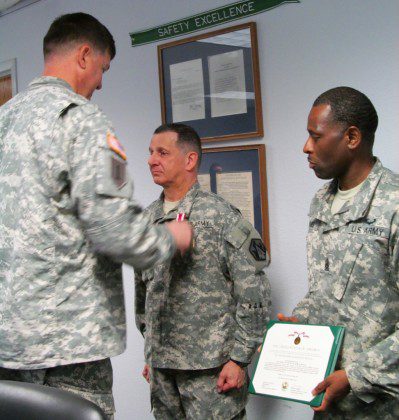
Outside of athletics, no other organization in the United States affirms its people by giving them awards and medals on a regular basis as does the military. One does not always know when this may happen. As with any military award, a soldier does not go out and participate in a contest to get a medal. The issuing of medals is determined by high ranking men and women who submit a formal request that recognizes an individual’s highest contribution to the success of the mission and the organization.
The MSM is presented to members of the United States Armed Forces who distinguish themselves with outstanding meritorious achievement or service to the United States. Recipients of the MSM are typically field grade officers (senior officers), generally at the level of major or higher. Typically they have ten or more years of service in the military.
As a captain –– a chaplain –– with nowhere near ten years of service, I would have never expected such a medal.
I was humbled last year to receive the Bronze Star. But when learned that I would receive the Meritorious Service Medal on June 4 I can say that I was genuinely shocked. It’s not false modesty. I am only a staff officer, not a company grade officer. I did not attend West Point, nor do I command a company.
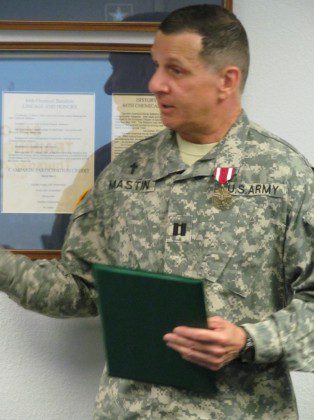
I was surprised to hear the names of past recipients such as Pat Tillman, Sen. John McCain, General Norman Schwarzkopf, General Wesley Clark, Rear Admiral Grace Murray Hopper (an American computer scientist), Janet Carol Wolfenbarger (a U.S. Air Force four-star general), and U.S. Army General Martin E. Dempsey, as well as many others.
Just before receiving the MSM I was nearly moved to tears to hear my commander, in front of the entire battalion staff, say that I was “the best selfless and caring officer that he had known in his 19 years of serving the military.” He used other words such as “relentless,” “disciplined,” “epitomizes positive attributes,” “exceptional counselor,” “excellent decision maker,” “consummate motivator,” “skilled writer and speaker,” and “instrumental in helping bereaving soldiers.” I certainly had to keep my ego in check.
I am grateful for those kind words. Not often in life do we hear such affirmation. We need to do this more often in religious life and in our families, in workplaces and communities. Hopefully, our caring attitude toward others will allow us to give praise and encouragement to people.
Perhaps my religious formation and our SCJ charism played a part in me receiving this award. My experience has allowed me to do what we normally do as religious: to simply be present with people, sincerely listening to their concerns, refraining from too much advice, and affirming that people have value and purpose in life.
I will always think of this medal as a reminder that I did not do anything extraordinary. Rather, it will remind me that there are many men and women in the world who dedicate their own lives to God’s service without ever receiving a simple “thank you” or seeking one. Those are the ones that deserve praise.

